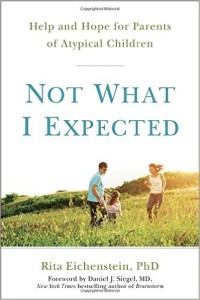 I highly recommend this book for parents of atypical children: Not What I Expected (2015, Perigree Books) by Rita Eichenstein, PhD. Starting with the play on words on that other popular parenting book, you quickly perceive that Eichenstein is a wonderful, creative neuropsychologist who conveys her compassion for parents starting with the thwarting of their expectations for a healthy, normal child.
I highly recommend this book for parents of atypical children: Not What I Expected (2015, Perigree Books) by Rita Eichenstein, PhD. Starting with the play on words on that other popular parenting book, you quickly perceive that Eichenstein is a wonderful, creative neuropsychologist who conveys her compassion for parents starting with the thwarting of their expectations for a healthy, normal child.
The predominant theme in this book might be expressed in the saying, “Mourn the child you thought you had, then embrace the one you do.” The author uses the framework of the five stages of grief to give parents the perspective of how their emotions can block them from getting the help their child needs, in spite of their best intentions.
However, Eichenstein’s explanations go well beyond a simplistic “time heals everything” understanding of grief. She addresses the raw, honest and dark thoughts and feelings of disappointed parents with respect and compassion. She knows her topic well from her experiences as a neuropsychologist who assesses children with learning differences. She has seen parents be unable to process the bad news, and the suffering that causes to the child and the parents’ relationship with each other.
Her frank descriptions reveal the “normal” responses to an unnatural situation: parents claiming that “I was like that when I was a kid” or “It’s just a mild case, no big deal” or even that “righteous anger has amphetamine and analgesic effects” (!). She gives easy-to-understand, demystifying information, including diagnoses of specific learning issues, including obsessive-compulsive disorder and auditory processing disorder, along with the better-known disabilities. She provides practical ways that parents can work through their denial, anger, bargaining and/or depression, moving ultimately into acceptance of their real child — and how they will parent that unique child with joy and pride.
Eichenstein recognizes that each parent and family may not go through all of these phases: some get stuck in denial, others bargaining. Using tools such as “boost your tolerance level” (reminders about protein for breakfast, walking or other daily exercise, and adequate sleep), Mindfulness Based Cognitive Therapy (MBCT), and other traditional and non-traditional therapeutic strategies, she advises parents how they can navigate the pitfalls, frustrations and exhaustion that come with being responsible for an atypical child.
Eichenstein’s words are like a soothing companion for suffering families. This book is very well-written and full of proven advise. It is a wonderful perspective to have, to be reminded of all the work that parents are going through. It ends with hope: active acceptance, and the acknowledgement that we have become better people from learning about people who are different.